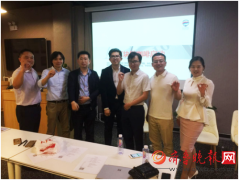Vientiane in the world | the cross-strait relationship of Wang Sen, a coffee expert in mainland China

The location of the cafe "the aftermath is not over".
"the aftermath is not over" is the name of a cafe in Taipei, and now it is also the name of a book. "aftereffect" is the "aftereffect" of Wang Xiaobo, a famous writer in mainland China, and "unfinished" expresses the memory of Wang Sen, a coffee expert on the mainland.
This year marks the 20th anniversary of Wang Xiaobo's death, and the aftermath recently held a new book launch in Taipei, Taiwan.com reported. Wang Sen said that writing this book is of course in the hope that more people will meet Wang Xiaobo, because he is so interesting! The title of the book was decided in 2012, but it took a long time to start writing. In a flash, five years have passed. Instead, the cafe named "aftermath" opened first.
It has been more than two years since the cafe opened, and it is filled with all kinds of works by Wang Xiaobo, both simplified and traditional. Wang Xiaobo's quotation cards can be found everywhere on the bookshelves. It says, "most of the polymorphisms are created by people who are quick to think."
The articles included in the new book "unfinished waves" use titles used by Wang Xiaobo, such as "Silent majority", "A maverick pig", "fun of thinking" and so on. Wang Sen pays tribute to Wang Xiaobo with this kind of old title and new content.
"Twenty years have passed, and I often wonder, if Bo had lived to the present and seen the present world, what would he have said and written?" Wang Sen, with a bald head and black-rimmed glasses, always mentions "Xiaobo" with gratitude. He told reporters that the book is a record that tells him about the world now.
"this book is actually Wang Sen's" Wang Xiaobo's words ", a kind of" intellectuals "dialogue across time and space." Taiwan writer Luo Yijun wrote in the preface that Wang Sen's love for Wang Xiaobo can be compared to the same emotion he promoted for the coffee shop: the possibility of a future study of this civilization can be neither numb, nothingness, or ruthless. Any strange feeling can have emotional imagination.
As early as 1994, the concept of Wang Sen, who was wandering everywhere, began to change after reading Wang Xiaobo. He said that Wang Xiaobo's book aroused his interest in reading, opened his horizons, and saw the possibilities of people and life. "if I hadn't met Wang Xiaobo, I might have been just a gangster or a villain."
In 2007, Wang Sen opened his first coffee shop in Beijing, with the name "staggered coffee". The name "stagger" comes from a sentence by the British philosopher Russell: "you know, stagger polymorphism is the source of happiness." Wang Xiaobo likes this sentence very much, and it has become Wang Sen's guide and idea of running a cafe over the past decade.
Over the past ten years, while running coffee shops, Wang Sen has also established the "staggered Coffee Dream School" to promote coffee culture and business philosophy, training more than 2000 students and opening more than 1000 cafes. He also published bestsellers such as "just want to Open a small Cafe" and "staggered because of you".
On his first trip to Taiwan in October 2012, Wang Sen fell in love with Taipei: "the smell of life here makes me feel more comfortable." It not only has the modern culture and order of Western cities, but also has the convenience and comfort brought by the industrious characteristics of mainlanders that people are kind and familiar with. "
Since then, he has come to Taipei five times a year and met Luo Yijun and many other Taiwanese friends through cafes. In his view, Taipei's coffee culture is highly developed, the average level is high, and many independent shops have their own personalities and pursuits. In contrast, the coffee industry in the mainland is currently in a stage of rapid expansion, and the product quality has improved rapidly, but more improvements are needed in the attribute building of cultural public space.
Wang Sen regards the cafe as an important cultural public space in urban life. He said that people should not only be in the relationship between consanguinity and interests, but also need a "third kind of relationship" that is non-utilitarian and comfortable. "Cafe is the best place to have a third type of relationship. The frequent friends in my life come from cafes. "
In order to find a reason for himself to stay in Taipei, and to commemorate Wang Xiaobo's special fate with Taiwan, Wang Sen decided to open his own cafe in Taipei.
As early as 1991, Taiwan's United Daily News awarded the literature award to Wang Xiaobo, who was unknown at that time, and the Golden Age was serialized in its supplement and published in Taiwan in August 1992. Soon after, Wang Xiaobo officially resigned from the university and became a freelance writer.
Wang Sen said that this award and prize have at least strengthened the confidence that Xiaobo's writing can "maintain a living." thanks to the discerning eyes of Taiwan's literary circles, Xiaobo has become a professional writer who blossoms inside and outside the wall. "in Taipei to commemorate Wang Xiaobo with the 'unfinished aftermath' cafe implies my gratitude to this place."
Wang Sen, 48, has many dreams: to bring Taiwan's best craftsman resources to the mainland to set up a special entrepreneurial university. But in any case, "when I retire in the future, I will stay in Taipei, guarding this cafe and introducing to everyone who doesn't know Wang Xiaobo: once upon a time, there was such a man, his name was Wang Xiaobo, and he was an interesting person."
Important Notice :
前街咖啡 FrontStreet Coffee has moved to new addredd:
FrontStreet Coffee Address: 315,Donghua East Road,GuangZhou
Tel:020 38364473
- Prev

The first block chain themed coffee in China has been officially launched.
Blockchain Coffee China's first blockchain-themed coffee was officially launched. Sun Mingwei, founder of blockchain, Gao Bin, Dean of Flag Point Business School, Zhang Shousong, President of Asian blockchain DACA Association, Gong Hui, President of British blockchain Association, he Chao, Secretary General of China Industrial Communications Association (CCIA) Block chain Special Committee, Zhu Peijiang, Secretary General of Zhongguancun Block chain Industry Alliance, and founder of Pioneer Coffee.
- Next

Love coffee, love sharing, Internet luxury coffee-Pemi Coffee unveiled in Chengdu in 2017
The 2017 Chengdu Global Innovation and Entrepreneurship Fair opened on May 7, 2017. as one of the supporting activities and the only catering section at this fair, what kind of ultimate experience will it bring? As one of the three major drinks in the world, coffee is loved by Chinese people for its unique flavor and refreshing effect. After visiting the exhibition, you might as well sit down and have a taste of Pemi coffee.
Related
- Can lightly roasted coffee beans be used to extract espresso? How finely should you grind high-quality coffee beans to make Italian latte?
- What is the difference between the world's top rose summer coffee and Yejia Shefi? What are the flavor characteristics of Yega Shefi coffee and Panama rose summer?
- The ceremony is full! Starbucks starts to cut the ribbon at a complimentary coffee station?!
- A whole Michelin meal?! Lucky launches the new "Small Butter Apple Crispy Latte"
- Three tips for adjusting espresso on rainy days! Quickly find the right water temperature, powder, and grinding ratio for espresso!
- How much hot water does it take to brew hanging ear coffee? How does it taste best? Can hot water from the water dispenser be used to make ear drip coffee?
- What grade does Jamaica Blue Mountain No. 1 coffee belong to and how to drink it better? What is the highest grade of Blue Mountain coffee for coffee aristocrats?
- What are the flavor characteristics of the world-famous coffee Blue Mountain No. 1 Golden Mantelin? What are the characteristics of deep-roasted bitter coffee?
- Can I make coffee a second time in an Italian hand-brewed mocha pot? Why can't coffee be brewed several times like tea leaves?
- Hand-brewed coffee flows with a knife and a tornado. How to brew it? What is the proportion of grinding water and water temperature divided into?

